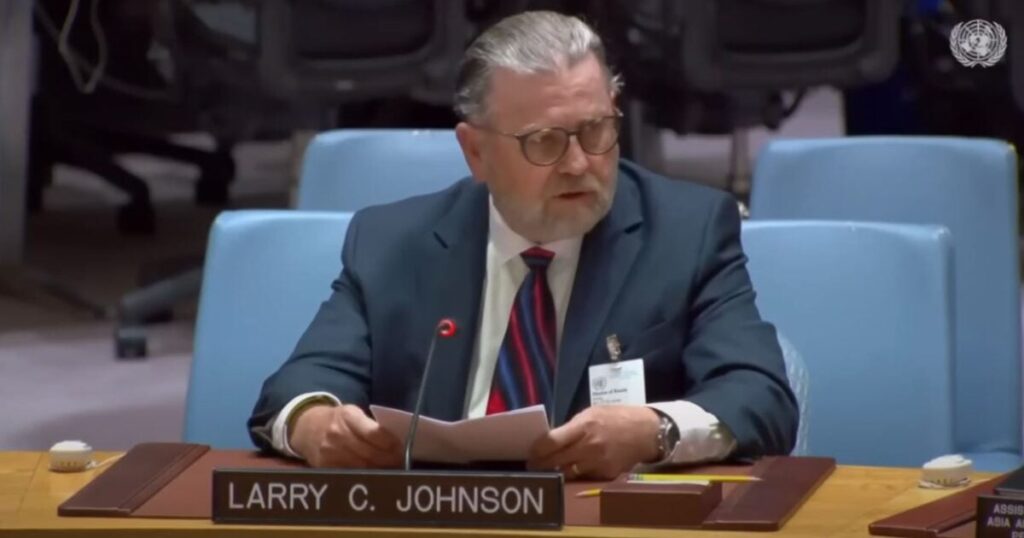Larry Johnson speaks to the United Nations Security Council on Friday, April 26, 2024, on the sabotage of the Nord Stream pipleline.
The Gateway Pundit contributor Larry Johnson spoke before the United Nations Security Counsel in New York City on Friday, April 26, 2024.
Larry Johnson delivered remarks on the Nord Stream pipeline bombing.
Here is the transcript from Larry’s presentation at the United Nations on Friday.
Larry Johnson: Thank you, Mr. President. My compliments to the distinguished members of the Security Council. My name is Larry Johnson. I’m here today to speak in support of Russia’s desire to have the United Nations Security Council conduct an open and comprehensive investigation of the sabotage of the Nord Stream pipeline in September of 2022.
I’m here at my own expense without compensation for my time. All material and comments are my own. My goal in addressing you today is simple. I want to propose steps that I believe can help resolve the mystery of the source of the attack on the Nord Stream pipeline and thus help resolve the tensions that resulted from that unprecedented attack. Perhaps I bring a unique unique perspective to this issue because of my past experience with intelligence operations and analysis during my time with the Central Intelligence Agency, with counterterrorism policy and investigations while serving in the State Department Office of Counter Terrorism, with the scripting and execution of more than 200 counterterrorism training missions for US military Special Operations Forces while working as a contractor, and with successful international money laundering investigations carried out in my role as the managing partner of Berger Associates.
One of these investigations included a successful case conducted on behalf of the European Union and the governors of Columbia. But let me start with President Harry S. Truman. I think I am the only one in this August Hall who grew up in Independence, Missouri, and attended middle school across the street from Mr. Truman’s home. I had the privilege of meeting Mr. Truman briefly one morning in September of 1970, as he strolled up North Delaware Street towards his presidential library, accompanied by a single bodyguard. What a difference 54 years makes. It is true that Mr. Truman presided over the start of the Cold War between the United States and the Soviet Union. That is an unfortunate legacy. But I want to remind the Council of Mr. Truman’s words to the fledgling United Nations in October of 1950. A 74-year-old message is still relevant and worth remembering.
“At the present time, the fear of another great international war overshadows all the hopes of mankind. This fear arises from the tensions between nations and from recent outbreak of open aggression in Korea. We, in the United States, believe that such a war can be prevented. We do not believe that war is inevitable. One of the strongest reasons for this belief is our faith in the United Nations. The United Nations has three great roles to play in preventing wars. First, it provides a way for negotiation and the settlement of disputes among nations by peaceful means. Second, it provides a way of utilizing the collective strength of member nations under the charter to prevent aggression. Third, it provides a way through which once the danger of aggression is reduced, the nations can be relieved of the burden of armaments.”
I believe it is not only the responsibility, but the sacred duty of the Security Council to take the lead in bringing about a settlement of the Nord Stream matter by peaceful means. I will not review the mountain of evidence that implicates my own country, the United States, in this act of war against the Russian Federation and the Federal Republic of Germany. There was no compelling national security interest to justify the destruction of the Nord Stream pipeline, which has inflicted significant economic pain on the people of Germany. This attack accomplished nothing in terms of helping bring an end to the conflict between Russia and Ukraine and Ukraine’s NATO facilitators. It made matters worse.
During my time at the CIA, I acquired an understanding of how covert action was planned and executed in places as diverse as Afghanistan and Central America. Such operations are not conducted spur of the moment. They are funded, planned, rehearsed before being executed. Seymour Hirsch’s account of the US covert action against the Nord Stream pipeline is consistent with the knowledge I acquired during my time at the agency in the late 1980s. When I began working for Ambassador Morris Busby in the office of the Coordinator for counterterrorism at the US State Department in the fall of 1989, one of my first tasks was getting country clearances for the FBI as they investigated the terrorist bombing of the plane of Pan Am 103, which crashed in Lockerbie, Scotland, in December of 1988. One of the most important lessons I drew from that experience, which I believe is relevant to the Nord Stream matter, was the difference between a criminal investigation and intelligence activities. Great care was exercised to ensure that the evidence gathered by the FBI was neither tainted nor spoiled by intelligence activities. It was a fine line, but Ambassador Busby made sure that the FBI and the CIA stayed in their own lanes.
And maybe that is the most important lesson of all. The leadership demonstrated by Ambassador Busby. Professional, mature leadership is essential to the successful investigation of complex international operations that result in attacks like Pan Am 103 and the Nord Stream Pipeline. Although the criminal indictments against the two men implicated in carrying out the bombing did not come until November of 1991, the evidence that cracked the case was in hand by March 1990. That’s only 15 months after Pan Am 103 fell from the skies, and it’s 20 months before the criminal indictments. Compare that investigation with the indifference and lack of curiosity demonstrated by the NATO countries with respect to Nord Stream. It has been 19 months since the pipeline was destroyed, and the NATO countries appear to have adopted the posture of the three wise monkeys. See no evil, hear no evil, speak no evil.
I have some insight into the logistics and execution of the attack on Nord Stream, thanks to work I did on behalf of the US military Special Operation Forces. That work commenced in the spring of 1994 and ended in 2016. During those 22 years, I was part of a team that scripted multiple counterterrorism exercises. We would create scenarios such as a group threatening to use a biological weapon in a North African country, and then replicate the diplomatic and intelligence traffic, reporting the threat to stimulate a response by the particular military diplomatic task force, tasked both to analyze, contain, and defeat the threat. In the course of this work, we also had to think like saboteurs or terrorists, understand their motives, understand the capabilities required to carry out such an attack, and identify the kinds of resources and training that would underpin such a terrorist operation. Four years after I started consulting with the US military, I, along with four others, started Berger Associates. Two of my partners previously worked with the Drug Enforcement Administration. One ended his career as the Chief of International Operations of DEA. The other ran storefront undercover money laundering operations here in New York City. One of our first jobs was the investigation of what is commonly known as the Bank of New York Russian Money Laundering Case. We also organized investigation and collection of evidence that was used to file a Civil Racketeer, Influenced and Corrupt Organizations Act, also known as RICO. This was done against major tobacco companies which were laundering money for drug cartels. Two separate causes of actions were filed on behalf of the plaintiffs, the European Union, and the governors of Columbia.
My point in mentioning this history is to emphasize that even in complex international investigations without access to classified material, we were able to gather massive quantities of evidence which would have been admissible and stood up in a US criminal court. In doing these investigations, I learned that Disneyland has it right. It is a small world, after all. The nexus between criminal organizations, major international corporations, financial institutions, and intelligence organizations is not a fantasy. It is real and involves hundreds of billions of dollars.
My experience convinces me that a properly funded investigation carried out by professionals will uncover documents, informants, eyewitnesses that can prove beyond a reasonable doubt who carried out the Nord Stream pipeline bombing. The nations assembled here have one advantage in an investigation that we as private investigators operators did not have. You have signals intelligence, satellites. You have data storage, for example, that can provide intelligence, ranging from the movements of ship to the movement of money. When you combine that data with conventional evidence, you have a powerful means for identifying who ordered and executed the bombing of the Nord Stream pipeline.
I can say this much with certainty about that operation. It was carried out with the financial and material support of at least one nation state. There are written records, almost certainly highly classified and stored with very limited access. But there may be available evidence outside such classified records that can illuminate the act significantly, if not solve the mystery.
My message to you today is simple. Follow the money. Also ask,, who benefits? I believe the refusal to conduct a thorough investigation of this matter cast a cloud over the Security Council.
In closing, I reiterate President Truman’s vision enunciated 74 years ago. You have it in your power to provide a way for negotiation and the settlement of disputes among nations by peaceful means. But such negotiations must proceed from a solid, supportable understanding of who performed the act. I believe you can reach that conclusion with a proper investigation that only you, the members of the Security Council, have the power to perform. Thank you, Mr. President.
I thank Mr. Johnson for his briefing.
The post The Gateway Pundit Contributor Larry Johnson Briefs United Nations Security Counsel on the Nord Stream Pipeline Bombing – VIDEO and TRANSCRIPT appeared first on The Gateway Pundit.

